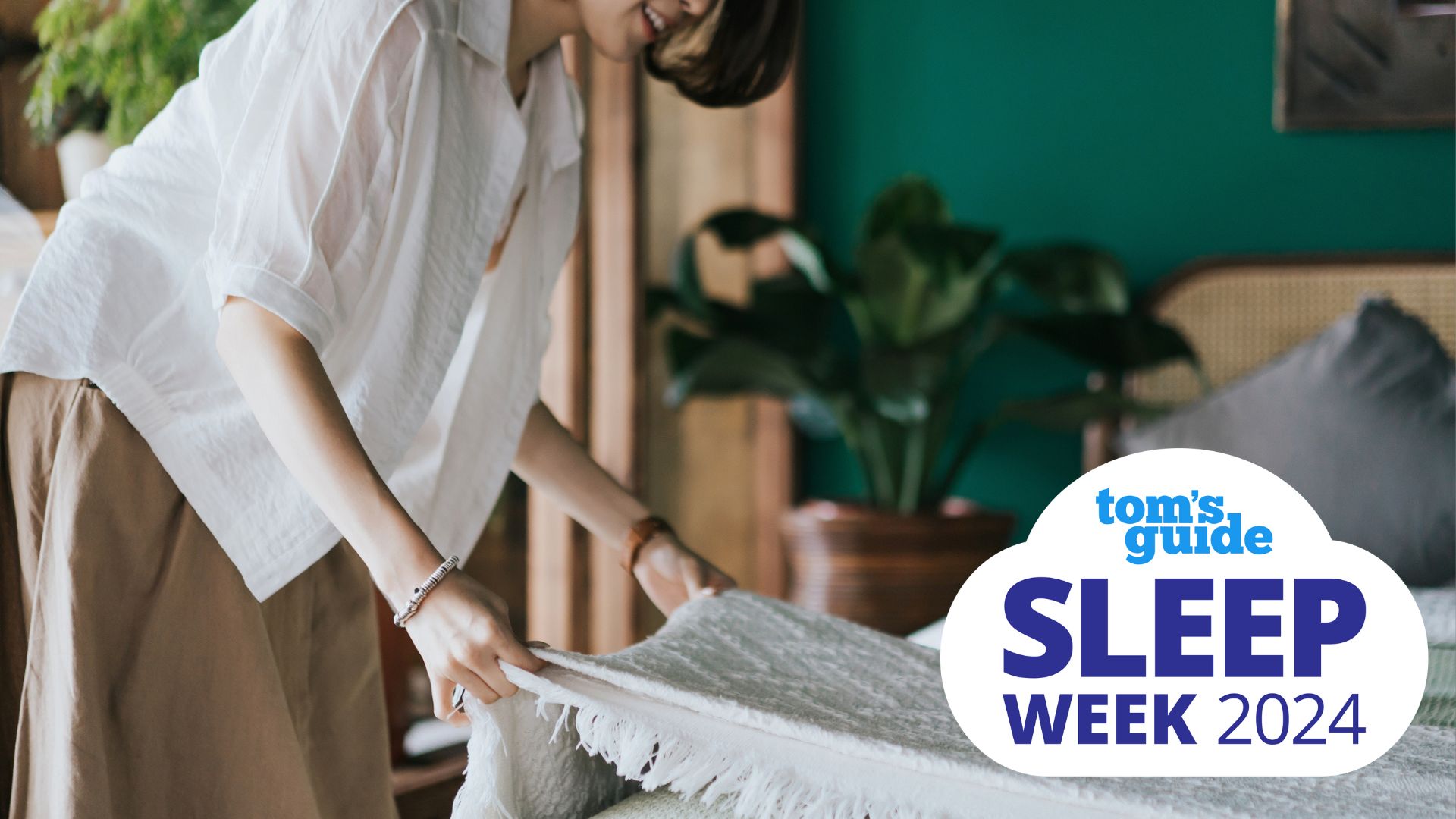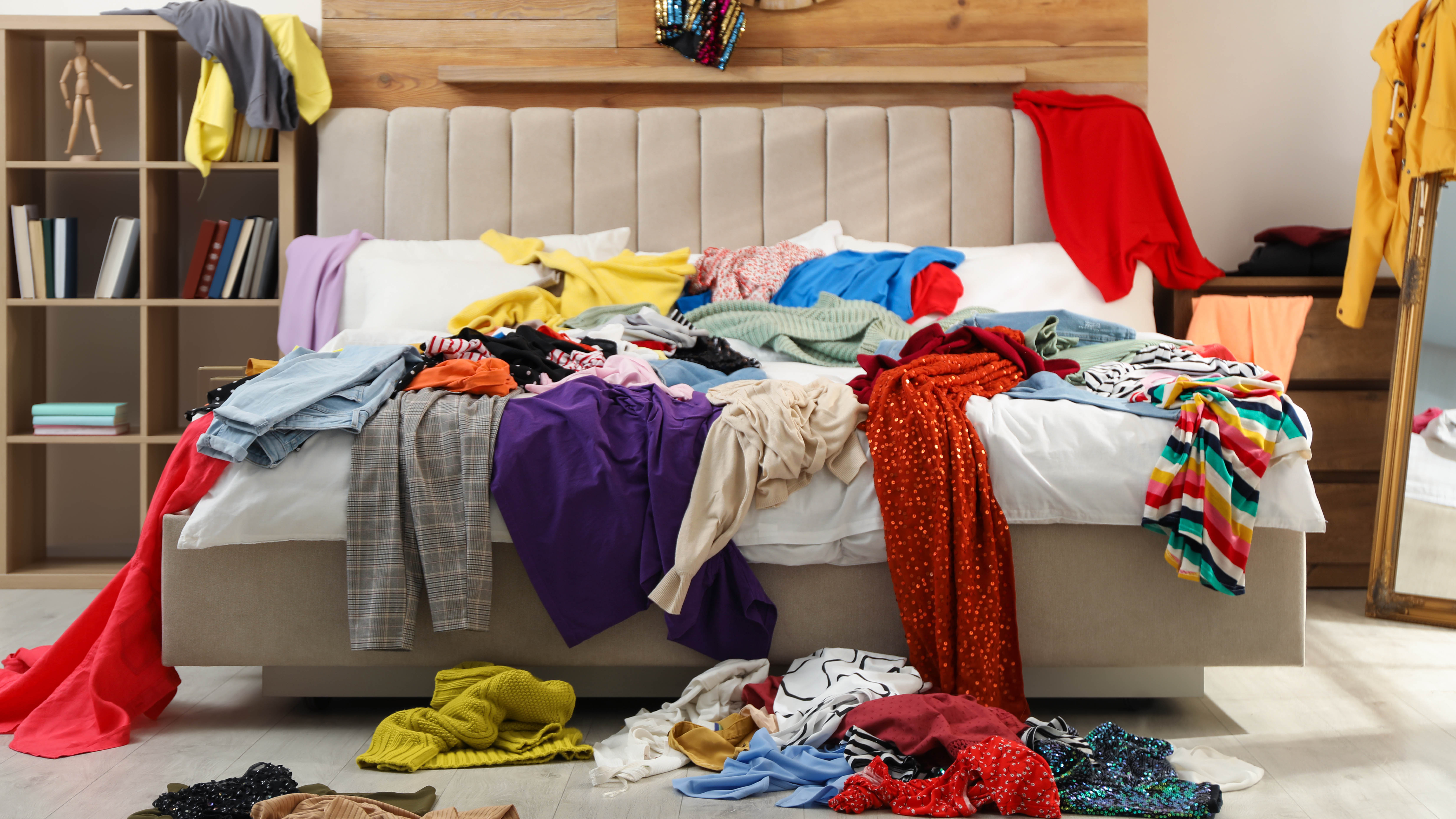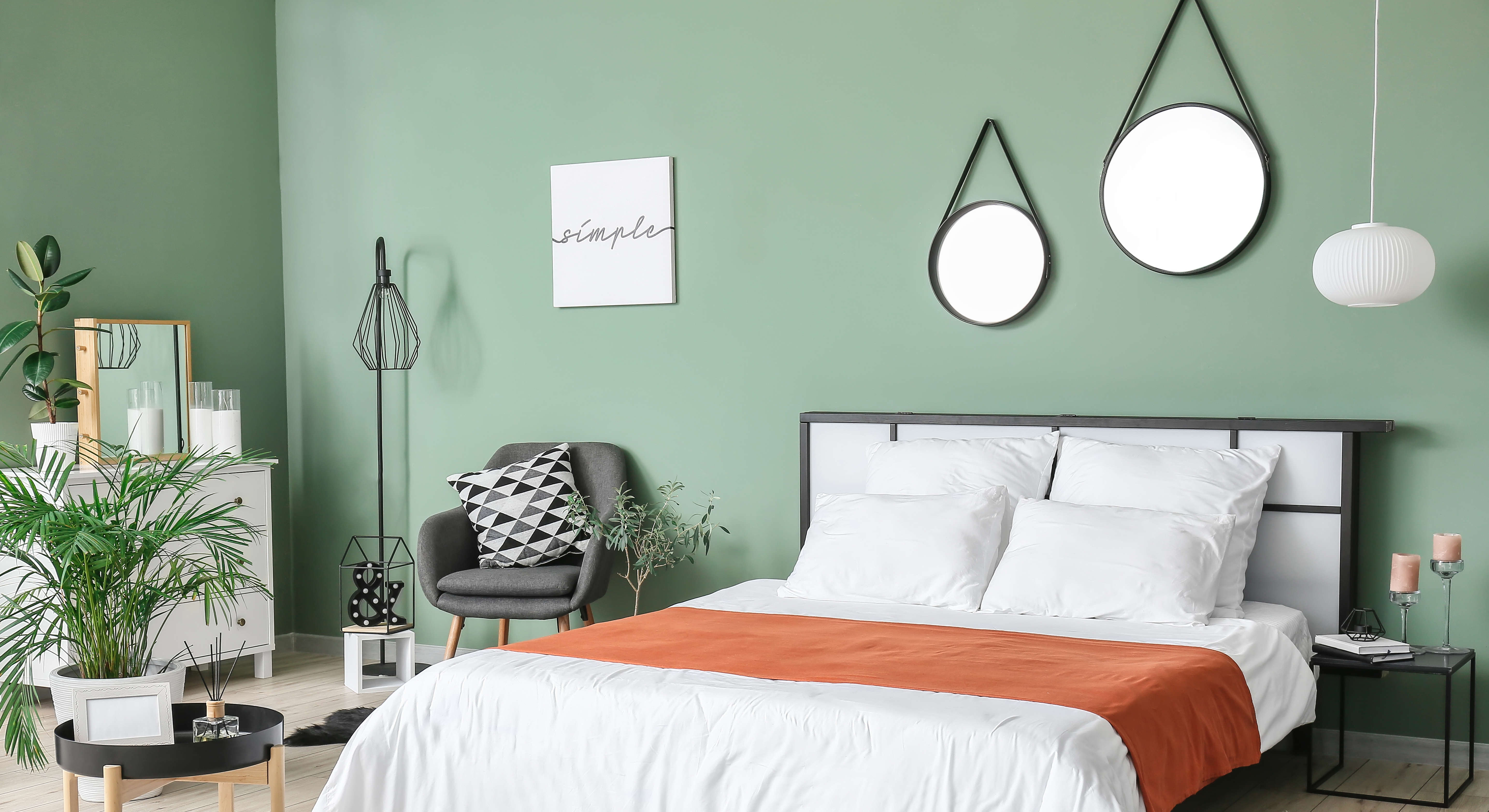Why decluttering your bedroom can make you fall asleep faster — sleep expert explains
Tidy up to transform your sleep

Research shows a cluttered bedroom can have a big impact on sleep. Even though you close your eyes in the run-up to drifting off, knowing that the clutter hasn’t disappeared can cause anxiety and take you longer to doze off.
It’s confirmed in a study by the American Academy of Sleep Medicine, which states a cluttered bedroom can compromise sleep quality, leading to the associated problems of cognitive dysfunction, depression and stress.
To coincide with Sleep Awareness Week 2024, we spoke to Claire Davies, Tom’s Guide’s Editor and Certified Sleep Science Coach, to learn how decluttering your bedroom could help you fall asleep faster.
Nectar Mattress: up to 40% off at Nectar Sleep
During Sleep Awareness Week, you can save up to 40% on memory foam and hybrid mattresses at Nectar Sleep. We rate the Nectar Memory Foam as the best mattress for most sleepers with a smaller budget seeking a breathable and supportive all-foam bed to relieve pressure on joints, reducing aches and pains. A queen is now reduced to $649 in the US and £600 with a free bedding bundle in the UK. You'll also get a lifetime warranty and year's sleep trial.
How does a messy bedroom interrupt your sleep?
You may wonder how an untidy bedroom can cause issues when falling asleep because we don’t drift off with our eyes open. However, it plays a part in our subconscious.
“For most people, a messy bedroom contributes to an underlying feeling of stress that can weigh on your mind whether you’re awake or asleep,” explains Davies. “So even though you may not be consciously aware of how clutter is affecting you, it can stop you from enjoying deep, restorative sleep at night.”
The lead-up to going to sleep causes the underlying issue of how being surrounded by clutter impacts our state of mind when preparing our bodies for sleep. “If you’re wading through clutter just to get into bed, you’ll start dreading your bedroom and may even delay going to bed at night. Do that for long enough, and you’ll start tampering with your natural sleep/wake rhythm,” says Davies.
“Feeling stressed by a messy, cluttered bedroom will also raise your cortisol levels at night, which is the exact opposite of what your body needs in order to relax for sleeping — and to fall asleep faster,” she adds.
Sign up to get the BEST of Tom's Guide direct to your inbox.
Get instant access to breaking news, the hottest reviews, great deals and helpful tips.
Bedroom clutter impacts brain function

Research has shown that a messy bedroom raises cortisol levels as clutter can cause a person to feel stressed by their sleeping environment. When you feel stressed, your cortisol levels rise, making it harder to fall asleep. “You may end up thinking you have a sleeping disorder, such as insomnia, when in reality you don’t,” says Davies.
Those who tend to hoard are more at risk of the negative impacts on sleep and overall daily function. In a study into how hoarding impacts the sleep of hoarders, lead author Dr Pamela Thacher, a psychologist at New York’s St Lawrence University, states: “Hoarders typically have problems with decision making and executive function; poor sleep is known to compromise cognition generally. So if hoarders have cluttered or unusable bedrooms, and less comfortable, functional beds, any existing risk of cognitive dysfunction, depression and stress may increase as sleep quality worsens.”
It sounds like a bedroom declutter is called for.
When a cluttered bedroom causes delay tactics
When faced with the thought of sleeping in a cluttered environment, it can delay when you retire at night. “Some people will delay going to bed to avoid their messy bedroom because of the way it makes them feel,” says Davies. “This type of behaviour can fall under revenge bedtime procrastination but is completely unnecessary and, if it continues for long enough, it will eventually interfere with your natural circadian rhythm (body clock) and cause sleep issues.”
To overcome this issue, Davies says the best approach is to tidy your bedroom earlier in the day, “Don’t leave it too close to bedtime when it may add to your stress levels — and always tidy your bed in the morning.”
Tip tip Falling asleep on clean sheets can also encourage a restful night, removing the uncomfortable feeling of sleeping on sheets that aren’t fresh. Davies advises washing your bed sheets regularly to reduce a build-up of dust mites, dead skin and other nasties from getting through to your mattress.
Clutter-bust your bedroom

When you’ve been busy all day, the last thing you feel like is tidying up your bedroom before settling down for the night, but it can reap big rewards. Take a look around your room and start with the small things. Here are a few clutter-busters to try.
Dirty dishes
Remove dirty plates and cups before you go to bed. Besides physical clutter Davies explains they can leave ‘scent clutter’ too. “Odors in your bedroom that may stop you from falling asleep easily — for example, the rancid smell of old milk from days’ old cereal bowls. Well-worn fitness gear, such as gym shoes, are another common source of ‘scent clutter’.
So rather than leaving clothes strewn across a bedroom chair or shoes scattered across the floor, tidy them away. Either put them back into your wardrobe, pop them in a laundry basket, or leave them to air.
Blue light
Another way to declutter your bedroom is to remove any blue light emitted from devices. “These can be too stimulating for your brain close to bedtime, making it harder for you to switch off and fall asleep quickly,” says Davies. “Studies show that blue light pollution also disrupts the production of melatonin, a hugely important hormone for sleep.”
Instead of scrolling through your phone before you attempt to drift off, pick up a book to calm your mind. One good habit is to leave any devices in another room at bedtime, which removes the temptation to scroll and the negative impact of blue light.
When your bedroom has a dual purpose
Without the luxury of having a large home, where there is a separate room for each function, sometimes rooms have to team up, and the bedroom is a prime example. However, this can cause a real issue when trying to separate different parts of your life to gain a peaceful night.
Home office With increased remote and hybrid working, more of us have to designate space in our homes to work. And when this is in the bedroom, it can cause mental clutter when trying to catch forty winks.
“A home working setup can remind you of your stressful job and a huge to-do list at night, a time when you should be winding down for sleep,” says Davies. While it might not be possible to move your home office into another space, to help restore calm at night, ensure the area is tidy and paperwork is out of sight.
Play room For parents with young children, Davies says it’s highly likely that your bedroom doubles as a playroom with soft toys and books scattered across your room, with ‘scent clutter’ from used nappies and milk bottles yet to be cleaned away. Removing these items will create a sanctuary for sleep rather than a room with a dual purpose.
Color clutter
Your bedroom should be a calm oasis to encourage sleep and relaxation, but your chosen colour scheme could prevent you from unwinding. Since the theory of color psychology suggests that color influences our emotions, moods, and behavior, it also impacts sleep.
Certain colors you should never use in a bedroom as they overstimulate our minds and have the reverse effect of helping us into a deep slumber. Red, purple, yellow, brown, and dark gray are best avoided, while the Sleep Foundation recommends blue as the best color to create a calm environment.
Items falling on you at night
Do you worry about something falling on you at night? Davies explains it can be a real problem that can stir your mind when you're trying to fall asleep. “An overly large piece of furniture placed close to your bed could also cause subconscious stress as you may worry about it falling on you at night.”
Perhaps you have a heavy picture, mirror, shelf or canopy fixed above your headboard. If any item does cause you concern, simply reposition or remove it from your room completely. You may also find it helpful to rearrange your furniture to create a calmer environment to induce sleep.
If the position of your furniture is causing you stress, you may want to discover how to balance the items in your bedroom — these 9 Feng Shui bedroom tips might well be your answer. As Davies suggests, “A simply appointed, calm, dark, quiet and clutter-free bedroom is best for helping you to fall asleep fast.”
More from Tom's Guide

Camilla Sharman has worked in publishing and marketing for over 30 years and has covered a wide range of sectors within the business and consumer industries both as a feature, content, and freelance writer.
As a business journalist, Camilla has researched articles for many different sectors from the jewellery industry to finance and tech, charities, and the arts. Whatever she’s covered, she enjoys delving deep and learning the ins and out of different topics, then conveying her research within engaging content that informs the reader. In her spare time, when she’s not in her kitchen experimenting with a new recipe, you’ll find her keeping fit at the gym. In the pool, stretching at a yoga class, or on a spin bike, exercise is her escape time. She also loves the great outdoors and if she’s not pottering about in her garden, she’ll be jumping on her bike for a gentle cycle ride.


